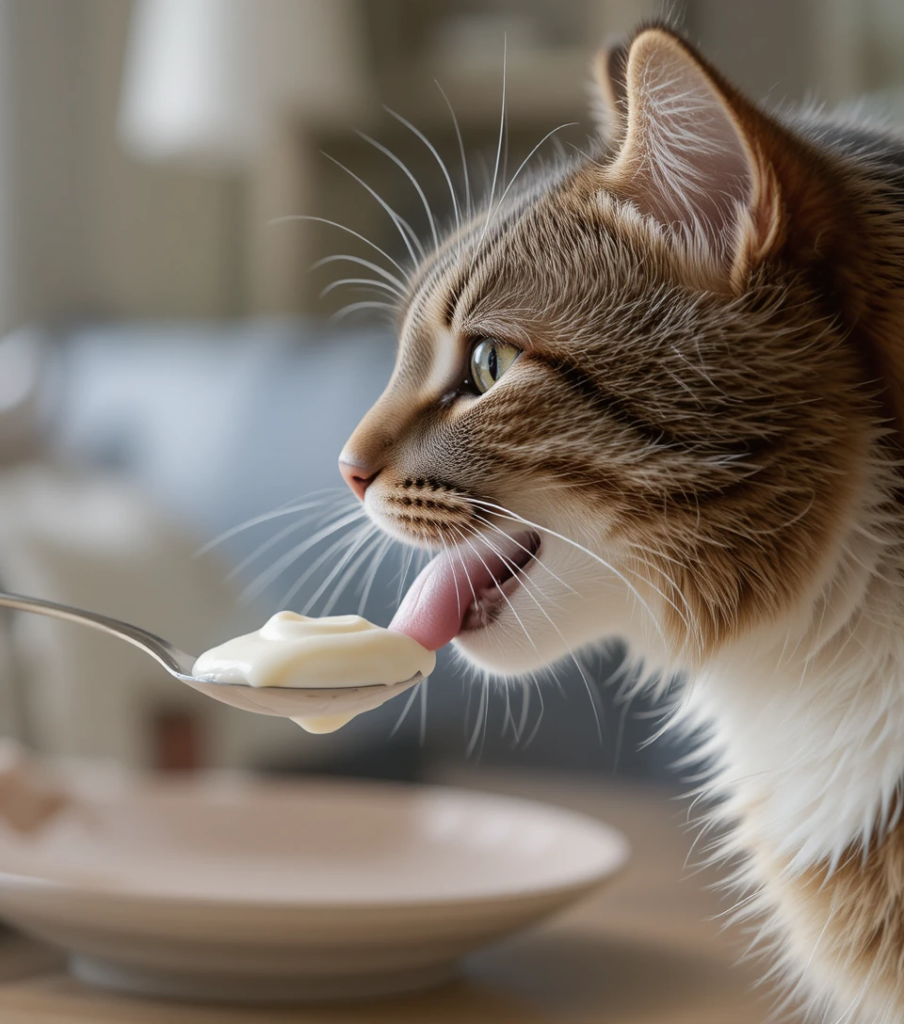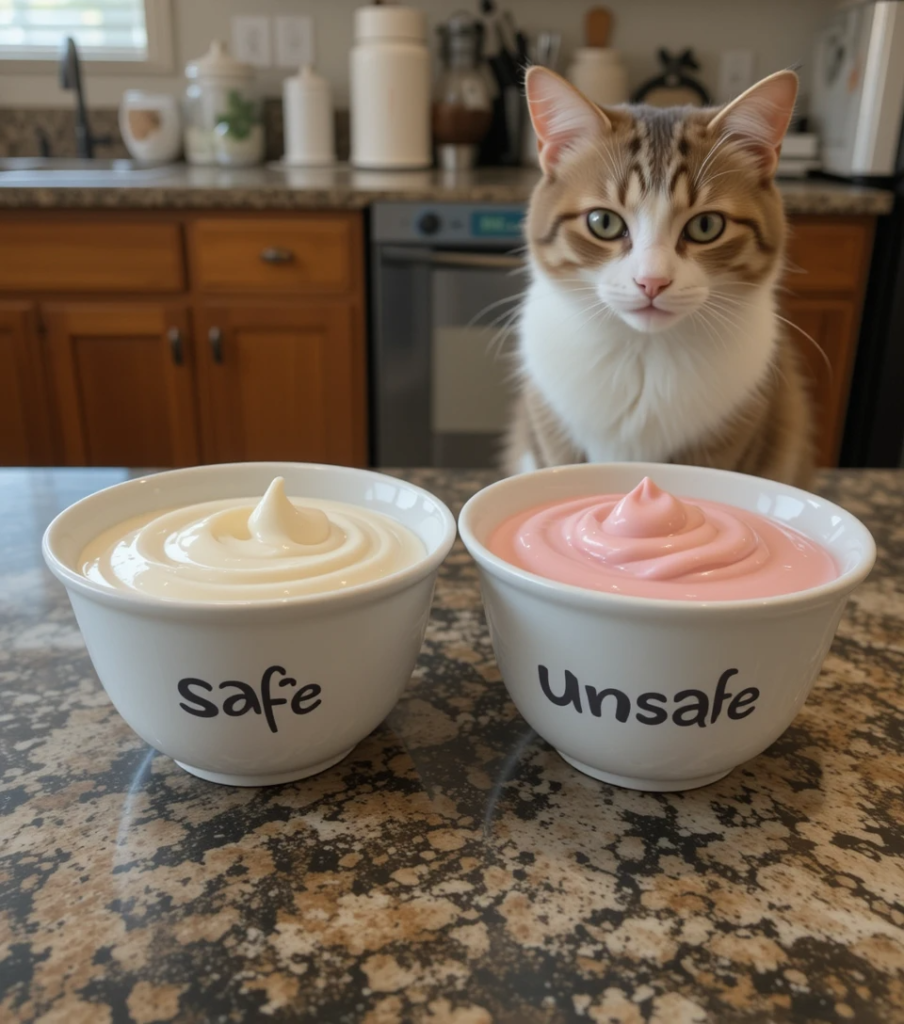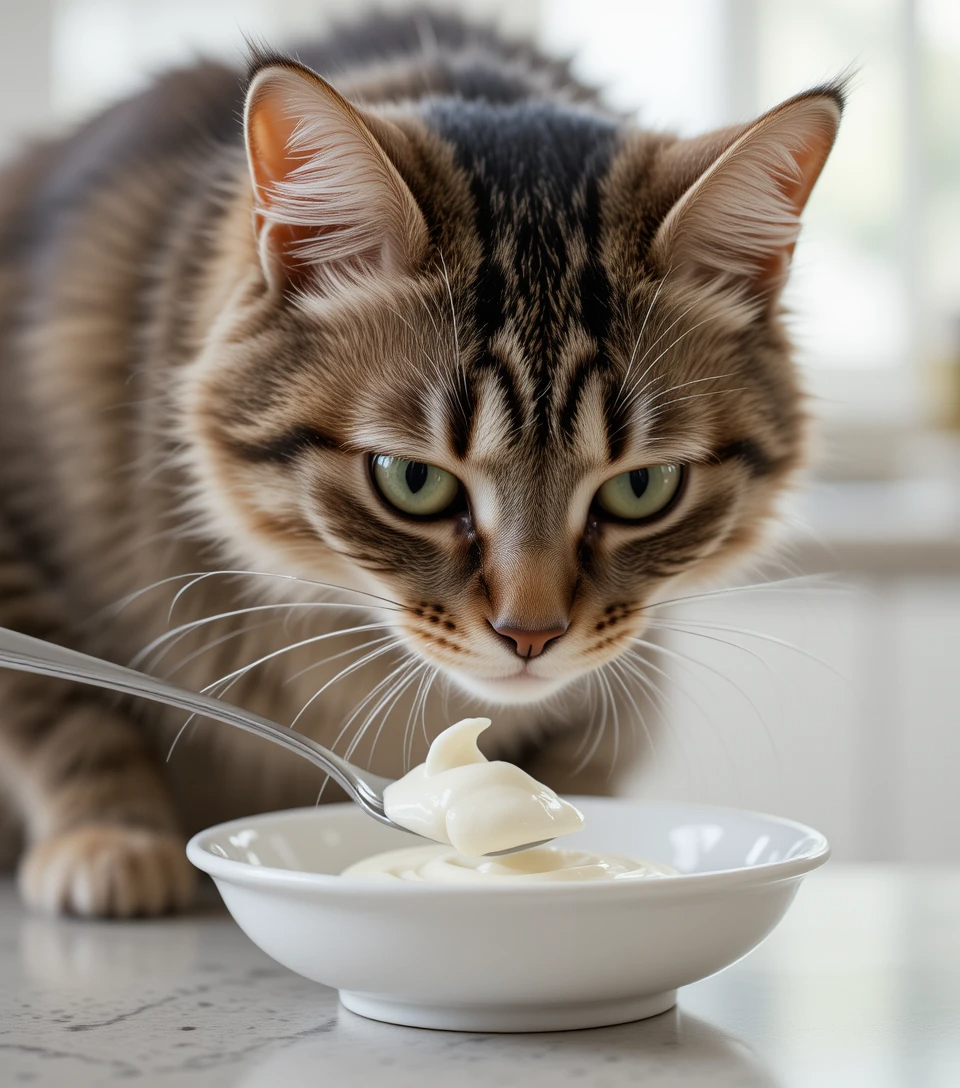🐾 Introduction
If you’ve ever enjoyed a cup of yogurt around your cat, chances are they’ve curiously sniffed—or even tried to sneak a taste. Yogurt is a beloved snack for many humans, thanks to its creamy texture and probiotic benefits. But can cats eat yogurt safely? The answer isn’t as simple as yes or no. Let’s dive into the sweet truth behind this creamy treat and see whether it deserves a spot in your cat’s snack rotation.
🥄 Can Cats Eat Yogurt?

Yes—but with caution. While small amounts of plain, unsweetened yogurt are generally safe for most healthy cats, not all yogurt is created equal. Some cats can tolerate it well due to the presence of probiotics and lower lactose content in specific varieties like Greek yogurt. However, others may experience digestive upset. So, moderation and type are key.
🧬 Understanding Feline Digestion
Unlike humans, adult cats are often lactose intolerant. As kittens, cats produce lactase, the enzyme needed to digest lactose in milk. But as they grow, their bodies produce less of this enzyme. This makes it harder for adult cats to digest dairy products, potentially leading to:
- Diarrhea
- Bloating
- Stomach cramps
The good news? Some yogurts, especially those with live active cultures, contain less lactose, making them easier to digest in small quantities.
🌿 Potential Health Benefits
Here’s the sweet side: when given correctly, yogurt can offer a few nutritional perks for your feline friend.
- Probiotics: Help promote healthy gut flora and support digestion.
- Calcium & Protein: Contribute to bone health and muscle development.
- Enrichment: Licking a small spoon of yogurt can be mentally stimulating for your cat.
However, these benefits only apply to plain, unsweetened yogurt—and only when served occasionally.
⚠️ Risks and Concerns
Despite its potential benefits, yogurt isn’t risk-free for cats. Here’s what to watch out for:
- Lactose Intolerance: Can lead to vomiting or diarrhea.
- Added Sugars & Artificial Sweeteners: Ingredients like xylitol are toxic to cats.
- Flavored Yogurts: Often contain fruits, syrups, or chocolate—not cat-friendly.
- High-Fat Content: Can contribute to weight gain and pancreatitis.
Always check the label, and when in doubt, consult your vet before sharing.
✅ Best Yogurt Types for Cats

If you choose to offer yogurt, here’s what to look for:
- Plain Greek Yogurt: Lower in lactose and higher in protein.
- Unsweetened: No sugar, no artificial sweeteners.
- Live Cultures: Helps improve digestibility.
Avoid any yogurt with fruit chunks, flavorings, or labels that say “light,” “sugar-free,” or “low-fat,” as they may include unsafe additives.
🐱 How to Introduce Yogurt Safely
When it comes to cats and yogurt, less is more. Follow these tips:
- Start with ½ teaspoon or less.
- Observe for any signs of discomfort over 24 hours.
- If tolerated, offer once a week—not daily.
- Use a clean spoon to avoid contamination.
Every cat reacts differently, so it’s essential to monitor and adapt.
🚫 Signs Your Cat Should Avoid Yogurt
Stop feeding yogurt if your cat experiences:
- Diarrhea
- Vomiting
- Gassiness
- Itchy skin or ears (possible food allergy)
- Lethargy
If these symptoms appear, consult your veterinarian immediately.
🐾 Healthy Alternatives to Yogurt
If your cat doesn’t tolerate dairy well, consider these safer options:
- Lactose-free cat treats
- Commercial probiotic supplements for cats
- Plain, cooked pumpkin (great for digestion)
- Veterinary-approved cat-safe snacks
These alternatives offer similar benefits—without the digestive gamble.
🧁 Final Verdict: The Sweet Truth
So, can cats eat yogurt? Yes, but it should be plain, unsweetened, and given in small amounts. While yogurt can provide gut-friendly probiotics and be a fun treat, it’s not essential to a cat’s diet. Think of it as an occasional indulgence—not a dietary staple.
When in doubt, always check with your vet. Your cat’s health is the sweetest truth of all.
❓ Frequently Asked Questions (FAQs)
1. Is yogurt toxic to cats?
No, plain yogurt is not toxic, but flavored or sweetened types can be harmful.
2. Can kittens eat yogurt safely?
Kittens can digest lactose better than adults, but it’s still best to avoid dairy unless advised by a vet.
3. What kind of yogurt is best for cats?
Plain, unsweetened Greek yogurt with live cultures is the safest choice.
4. How much yogurt can a cat eat?
Start with ½ teaspoon, and never exceed 1–2 teaspoons weekly.
5. Can cats eat flavored yogurt?
No. Flavored yogurts often contain sugar, xylitol, or ingredients toxic to cats.
6. Are probiotics in yogurt good for cats?
Yes, but cat-specific probiotics are more effective and safer.
7. Why do some cats love yogurt while others don’t?
Cats have individual taste preferences—some are curious, while others aren’t interested.
8. What are the symptoms of lactose intolerance in cats?
Diarrhea, gas, bloating, and vomiting are common signs.
9. Is Greek yogurt safer for cats than regular yogurt?
Yes, it has less lactose and more protein, making it a better choice.
10. Can I give yogurt to my cat every day?
No. It’s best as an occasional treat, not a daily snack.

